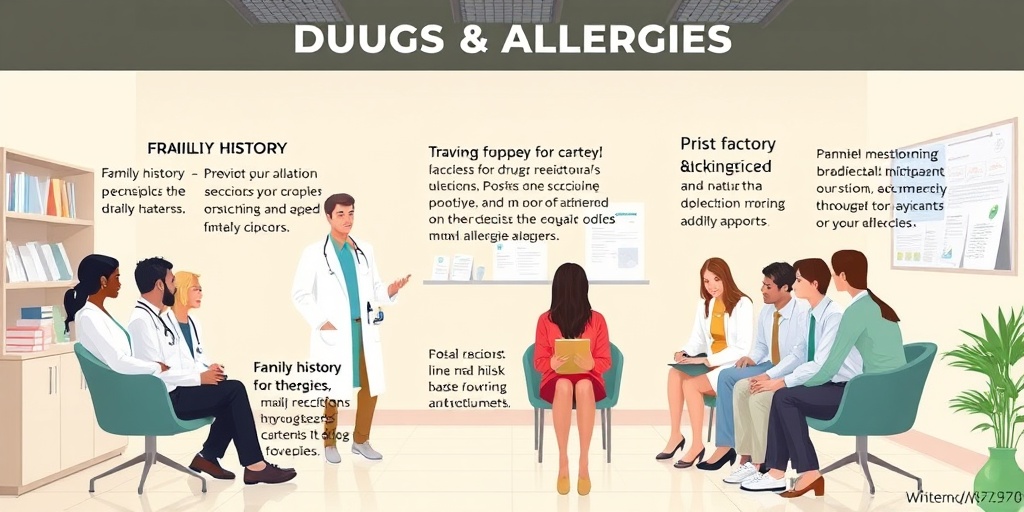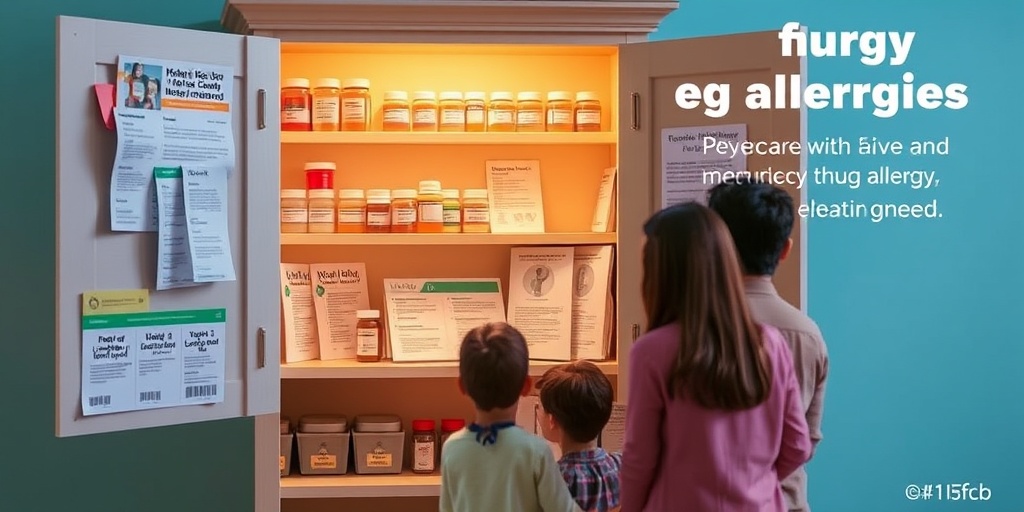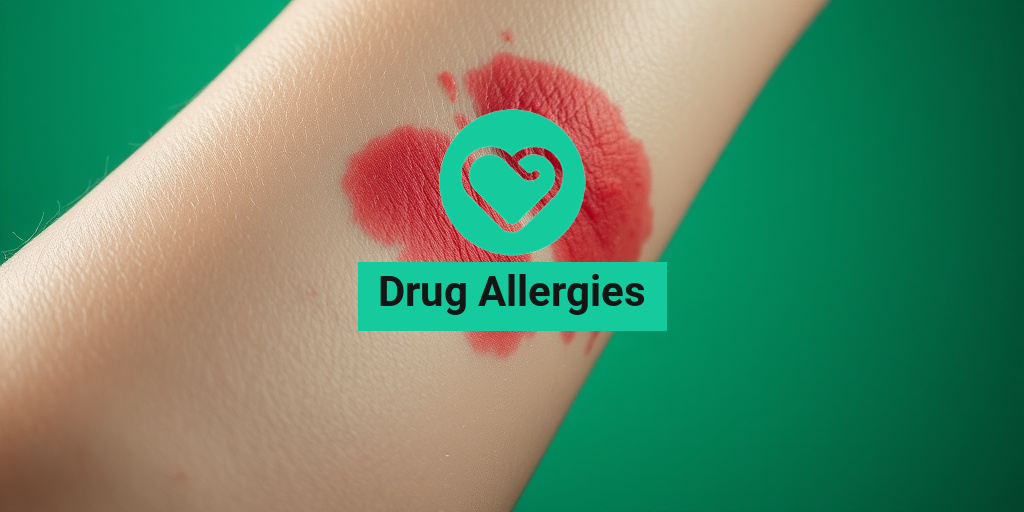What Are Drug Allergies?
Drug allergies are a type of adverse reaction that occurs when the immune system mistakenly identifies a medication as a harmful substance. This can lead to a range of symptoms, some of which can be quite severe. Understanding drug allergies is crucial for anyone taking medication, as it can help prevent serious health complications.
Understanding the Immune Response
When a person with a drug allergy takes a medication, their immune system reacts by producing antibodies. These antibodies trigger the release of chemicals, such as histamine, which can cause various symptoms. It’s important to note that drug allergies are different from drug side effects, which are expected reactions to medications.
Common Causes of Drug Allergies
Drug allergies can be caused by a wide range of medications. Some of the most common culprits include:
- Antibiotics: Penicillin and sulfa drugs are well-known for causing allergic reactions.
- Nonsteroidal Anti-Inflammatory Drugs (NSAIDs): Aspirin and ibuprofen can also trigger allergies in some individuals.
- Anticonvulsants: Medications used to treat seizures can lead to allergic reactions.
- Chemotherapy Drugs: Some cancer treatments may provoke an allergic response.
It’s essential to be aware of your medication history and any known allergies to avoid potential reactions. If you’re unsure about your risk, consulting with a healthcare professional can provide clarity.
Common Drug Allergy Symptoms
Recognizing the symptoms of drug allergies is vital for prompt treatment and management. Symptoms can vary widely in severity and may include:
Skin Reactions
One of the most common signs of a drug allergy is a skin reaction. This can manifest as:
- Rashes: Red, itchy patches on the skin.
- Hives: Raised, swollen areas that can be very itchy.
- Swelling: Particularly around the face, lips, or tongue.
Respiratory Symptoms
Some individuals may experience respiratory issues, which can include:
- Shortness of Breath: Difficulty breathing or wheezing.
- Chest Tightness: A feeling of pressure in the chest.
- Throat Swelling: This can lead to difficulty swallowing or speaking.
Gastrointestinal Symptoms
Drug allergies can also affect the digestive system, leading to symptoms such as:
- Nausea: Feeling sick to the stomach.
- Vomiting: Expelling contents from the stomach.
- Diarrhea: Loose or watery stools.
Severe Reactions: Anaphylaxis
In rare cases, drug allergies can lead to a life-threatening condition known as anaphylaxis. This severe allergic reaction requires immediate medical attention and can include symptoms such as:
- Rapid Heartbeat: A sudden increase in heart rate.
- Loss of Consciousness: Fainting or feeling lightheaded.
- Severe Swelling: Particularly in the throat, which can obstruct breathing.
If you suspect you have a drug allergy, it’s crucial to seek medical advice promptly. A healthcare provider can perform tests to determine the cause of your symptoms and recommend appropriate treatment options.
For more information on drug allergies and to explore evidence-based health answers, consider visiting Yesil Health AI. They provide valuable resources to help you understand your health better.
In conclusion, being informed about drug allergies and their symptoms can empower you to take control of your health. Always communicate with your healthcare provider about any known allergies and reactions to medications to ensure safe and effective treatment. 🌟

Causes of Drug Allergies
Drug allergies occur when the immune system mistakenly identifies a medication as a harmful substance. This immune response can lead to various symptoms, ranging from mild to severe. Understanding the causes of drug allergies is crucial for prevention and management.
Immune System Response
At the core of drug allergies is the immune system’s reaction. When a person takes a medication, their body may produce antibodies against it. This process is known as sensitization. Upon subsequent exposure to the same drug, the immune system releases chemicals, such as histamines, leading to allergic symptoms. Common symptoms include:
- Rashes or hives
- Itching
- Swelling of the face, lips, or throat
- Difficulty breathing
Types of Medications That Can Cause Allergies
Almost any medication can potentially cause an allergic reaction, but some categories are more commonly associated with drug allergies. These include:
- Antibiotics: Penicillin and sulfa drugs are notorious for causing allergic reactions.
- Nonsteroidal anti-inflammatory drugs (NSAIDs): Ibuprofen and aspirin can trigger allergies in some individuals.
- Anticonvulsants: Medications used for epilepsy can also lead to allergic responses.
- Vaccines: Although rare, some vaccines can cause allergic reactions.
Genetic Factors
Genetics can play a significant role in the likelihood of developing drug allergies. Individuals with a family history of allergies or asthma may be more susceptible to drug allergies. Certain genetic markers have been identified that can increase the risk of adverse reactions to specific medications. Understanding your family history can help in assessing your risk.
Risk Factors for Drug Allergies
While anyone can develop a drug allergy, certain risk factors can increase the likelihood of experiencing an allergic reaction to medications. Being aware of these factors can help in taking preventive measures.
Previous Allergic Reactions
If you have a history of allergies, especially to medications, you are at a higher risk of developing drug allergies. This includes not only drug allergies but also allergies to foods, insect stings, or environmental allergens. Always inform your healthcare provider about any past allergic reactions.
Age and Gender
Age can influence the risk of drug allergies. Children and older adults may be more susceptible due to their developing or weakened immune systems. Additionally, some studies suggest that women may be at a higher risk than men for certain drug allergies, possibly due to hormonal differences.
Multiple Medications
Taking multiple medications simultaneously, known as polypharmacy, increases the risk of drug allergies. The more medications you take, the higher the chance of an interaction or an allergic reaction. It’s essential to regularly review your medications with your healthcare provider, especially if you are on long-term treatment.
Chronic Health Conditions
Individuals with chronic health conditions, such as asthma, eczema, or other allergic conditions, may have a higher risk of developing drug allergies. These conditions can sensitize the immune system, making it more reactive to medications.
Environmental Factors
Environmental factors, such as exposure to allergens or pollutants, can also play a role in the development of drug allergies. For instance, individuals living in areas with high pollution levels may have a compromised immune system, making them more susceptible to allergic reactions.
In conclusion, understanding the causes and risk factors of drug allergies is essential for prevention and effective management. If you suspect you have a drug allergy, consult with a healthcare professional for proper diagnosis and treatment. 🩺💊

Diagnosing Drug Allergies
Diagnosing drug allergies can be a complex process, as symptoms often mimic those of other conditions. Understanding the signs and working closely with healthcare professionals is crucial for accurate diagnosis and effective management.
Understanding Drug Allergies
A drug allergy occurs when the immune system mistakenly identifies a medication as a harmful substance. This can lead to a range of symptoms, from mild reactions like rashes to severe, life-threatening conditions such as anaphylaxis. It’s essential to differentiate between a true allergy and other adverse drug reactions, which may not involve the immune system.
Common Symptoms of Drug Allergies
Recognizing the symptoms of drug allergies is the first step in diagnosis. Common symptoms include:
- Skin Reactions: Hives, rashes, or itching.
- Respiratory Issues: Difficulty breathing, wheezing, or nasal congestion.
- Gastrointestinal Symptoms: Nausea, vomiting, or diarrhea.
- Anaphylaxis: A severe, life-threatening reaction that requires immediate medical attention.
Steps to Diagnose Drug Allergies
Diagnosing a drug allergy typically involves several steps:
- Medical History: Your healthcare provider will ask about your medical history, including any previous reactions to medications.
- Physical Examination: A thorough examination can help identify symptoms and their severity.
- Allergy Testing: In some cases, skin tests or blood tests may be conducted to confirm an allergy.
- Medication Challenge: Under strict medical supervision, you may be given the suspected drug to observe any reactions.
It’s important to note that self-diagnosing can be dangerous. Always consult a healthcare professional if you suspect you have a drug allergy. 🩺
Managing Drug Allergies
Once diagnosed, managing drug allergies becomes a priority to prevent future reactions and ensure your safety. Here are some effective strategies for managing drug allergies.
Avoidance of Trigger Medications
The most effective way to manage drug allergies is to avoid the medications that trigger your symptoms. This may involve:
- Informing Healthcare Providers: Always inform your doctors and pharmacists about your allergies.
- Wearing Medical Identification: Consider wearing a medical alert bracelet that lists your allergies.
- Keeping a Medication List: Maintain an updated list of medications you are allergic to and share it with your healthcare team.
Alternative Medications
If you have a known drug allergy, your healthcare provider may recommend alternative medications that are less likely to cause a reaction. Discussing your options can help you find safe and effective treatments for your condition.
Emergency Action Plan
For individuals with a history of severe reactions, having an emergency action plan is crucial. This plan should include:
- Recognizing Symptoms: Be aware of the signs of an allergic reaction.
- Carrying an EpiPen: If prescribed, always carry an epinephrine auto-injector for severe reactions.
- Emergency Contacts: Keep a list of emergency contacts and healthcare providers readily available.
Regular Follow-ups
Regular follow-ups with your healthcare provider can help monitor your condition and adjust your management plan as needed. This is especially important if you are prescribed new medications or if your health status changes.
In conclusion, understanding and managing drug allergies is essential for maintaining your health and well-being. By being proactive and informed, you can significantly reduce the risk of adverse reactions and lead a healthier life. 🌟

Treatment Options for Drug Allergies
When it comes to drug allergies, understanding the treatment options available is crucial for managing symptoms and ensuring safety. Drug allergies occur when the immune system reacts adversely to a medication, leading to a range of symptoms that can vary in severity. Here, we’ll explore the most common treatment options available for those affected by drug allergies.
1. Avoidance of the Triggering Drug
The most effective way to manage a drug allergy is to avoid the medication that causes the reaction. This may seem straightforward, but it’s essential to communicate your allergy to all healthcare providers. Carrying a medical alert card or wearing a bracelet can also help inform emergency personnel about your allergy in case of an emergency. 🏥
2. Antihistamines
For mild allergic reactions, antihistamines can be effective in alleviating symptoms such as itching, hives, and rashes. These medications work by blocking histamine, a substance in the body that causes allergic symptoms. Common over-the-counter options include:
- Diphenhydramine (Benadryl)
- Loratadine (Claritin)
- Cetirizine (Zyrtec)
Always consult with a healthcare professional before starting any medication, especially if you have a history of drug allergies.
3. Corticosteroids
For more severe reactions, such as swelling or difficulty breathing, corticosteroids may be prescribed. These medications help reduce inflammation and suppress the immune response. They can be administered orally or topically, depending on the severity of the reaction. 💊
4. Epinephrine
In cases of anaphylaxis, a life-threatening allergic reaction, immediate treatment with epinephrine is essential. This medication is typically delivered via an auto-injector (like an EpiPen) and works quickly to reverse the symptoms of anaphylaxis, such as throat swelling and low blood pressure. If you have a known severe drug allergy, carrying an epinephrine auto-injector is crucial.
5. Desensitization Therapy
For some individuals, desensitization therapy may be an option. This process involves administering gradually increasing doses of the drug under medical supervision to build tolerance. It’s typically reserved for patients who require a specific medication that they are allergic to and should only be conducted in a controlled environment, such as a hospital. 🏥
Preventing Drug Allergies
While not all drug allergies can be prevented, there are several strategies that can help minimize the risk of developing these allergies. Understanding your body and being proactive can make a significant difference.
1. Know Your Family History
Genetics can play a role in drug allergies. If you have a family history of allergies, it’s essential to discuss this with your healthcare provider. They can help you understand your risks and may recommend alternative medications that are less likely to cause an allergic reaction. 🧬
2. Inform Your Healthcare Providers
Always inform your doctors and pharmacists about any known drug allergies. This information is vital for preventing exposure to medications that could trigger a reaction. Keeping an updated list of your allergies and sharing it during medical visits can help ensure your safety.
3. Read Medication Labels
When taking over-the-counter medications, always read the labels carefully. Some medications may contain ingredients that you are allergic to, even if they are not the primary active ingredient. If you’re unsure, consult with a healthcare professional before taking any new medication.
4. Monitor New Medications
When prescribed a new medication, monitor your body for any unusual reactions, especially during the first few doses. If you notice any symptoms of an allergic reaction, such as rash, itching, or swelling, contact your healthcare provider immediately.
5. Consider Allergy Testing
If you have a history of drug allergies, your doctor may recommend allergy testing to identify specific sensitivities. This can help tailor your treatment plan and avoid medications that could cause adverse reactions. Testing can provide valuable insights into your health and help you make informed decisions about your medication options.
By taking these preventive measures and understanding treatment options, individuals can better manage drug allergies and lead healthier lives. Remember, knowledge is power when it comes to your health! 💪

Frequently Asked Questions about Drug Allergies
What are drug allergies?
Drug allergies occur when the immune system reacts adversely to a medication. This reaction can range from mild to severe and may include symptoms such as rashes, itching, or even anaphylaxis in extreme cases.
What are common symptoms of drug allergies?
- Skin rashes or hives
- Itching
- Swelling of the face, lips, or tongue
- Difficulty breathing
- Gastrointestinal issues like nausea or vomiting
How can I tell if I have a drug allergy?
If you experience any of the symptoms mentioned above after taking a medication, it is important to consult a healthcare professional. They may perform tests or review your medical history to determine if you have a drug allergy.
What is the difference between drug allergies and drug side effects?
Drug allergies are immune responses to a medication, while drug side effects are unintended effects that occur regardless of the immune system’s involvement. Side effects can happen to anyone taking the medication, whereas allergies are specific to individuals with a hypersensitive immune response.
Are certain people more prone to drug allergies?
Yes, some individuals may have a genetic predisposition to drug allergies. Additionally, those with a history of allergies or asthma may be at a higher risk.
What should I do if I suspect I have a drug allergy?
If you suspect you have a drug allergy, stop taking the medication immediately and seek medical advice. Your healthcare provider can help determine the best course of action and may recommend alternative treatments.
Can drug allergies be treated?
Treatment for drug allergies typically involves avoiding the offending medication. In some cases, antihistamines or corticosteroids may be prescribed to alleviate symptoms. Severe reactions may require emergency treatment.
What is NKDA in relation to drug allergies?
NKDA stands for “No Known Drug Allergies.” It is a term used in medical records to indicate that a patient has not reported any allergies to medications.
How are drug allergies classified in medical coding?
In medical coding, drug allergies are classified using the ICD-10 coding system. Specific codes are assigned based on the type and severity of the allergy.
Can drug allergies develop over time?
Yes, it is possible for individuals to develop drug allergies later in life, even if they have taken the medication without issues in the past. This can happen due to changes in the immune system or repeated exposure to the drug.
Are there any common medications that cause drug allergies?
Some common medications known to cause drug allergies include:
- Penicillin and other antibiotics
- Nonsteroidal anti-inflammatory drugs (NSAIDs)
- Anticonvulsants
- Chemotherapy drugs
What should I carry if I have a known drug allergy?
If you have a known drug allergy, it is advisable to carry an allergy card or wear a medical alert bracelet. This can provide critical information in case of an emergency.




